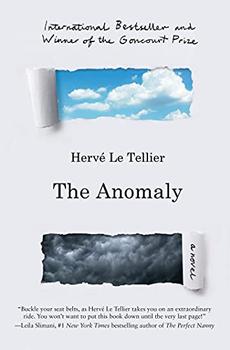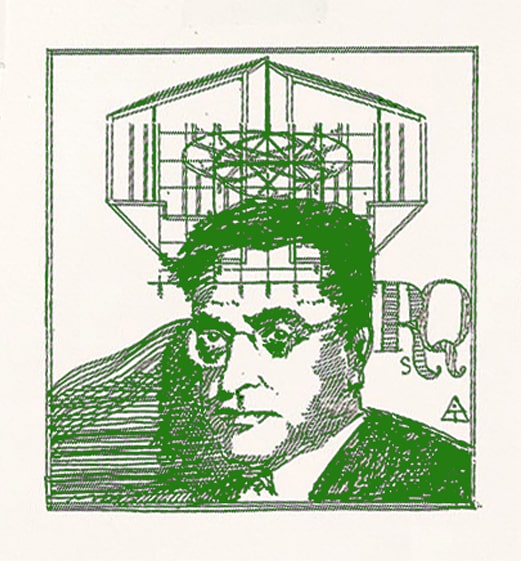Summary | Excerpt | Reviews | Beyond the Book | Read-Alikes | Genres & Themes | Author Bio

A Novel
by Hervé Le TellierThis article relates to The Anomaly
 Hervé Le Tellier, the author of the novel The Anomaly, is a member of Oulipo. Oulipo is an international literary group that was founded in 1960 and embraces "formal and procedural constraints to achieve literature's possibilities." The name comes from the French "Ouvroir de littérature potentielle" (OuLiPo), which translates roughly to "workshop of potential literature." By inventing new structures and forms, chiefly by imposing and then working within external constraints, they attempt a "méthodique, systématique" (methodical, systematic) exploration of the potentials of literature. As cofounder Raymond Queneau put it: "Oulipians are rats who build the labyrinth from which they will try to escape."
Hervé Le Tellier, the author of the novel The Anomaly, is a member of Oulipo. Oulipo is an international literary group that was founded in 1960 and embraces "formal and procedural constraints to achieve literature's possibilities." The name comes from the French "Ouvroir de littérature potentielle" (OuLiPo), which translates roughly to "workshop of potential literature." By inventing new structures and forms, chiefly by imposing and then working within external constraints, they attempt a "méthodique, systématique" (methodical, systematic) exploration of the potentials of literature. As cofounder Raymond Queneau put it: "Oulipians are rats who build the labyrinth from which they will try to escape."
Contra movements like modernism (in which writers rejected external constraints) and surrealism (which emphasized the unconscious and the automatic), Oulipo writers have found freedom and imagination within rigid parameters and restrictions, even including mathematical limitations. Instead of calling themselves a literary movement, they modeled themselves on the Bourbaki, a collective started by French mathematicians in the 1930s who intended to create a "solid foundation" for mathematics. Le Tellier himself is a trained mathematician as well as a linguist and writer.
The foundational work of Oulipo literature is Raymond Queneau's book of poetry Cent mille milliards de poèmes or A Hundred Thousand Billion Poems. The book includes ten sonnets of 14 lines each, but each line is printed on an individual strip and is composed so the lines could be reshuffled into billions of combinations without breaking the scheme or grammar. In this way, the book is complete unto itself but also, in the words of Guardian writer Andrew Gallix, "always in the process of becoming (with a little help from the reader)," a signature of Oulipo works.
Perhaps the most famous example of an Oulipo text is Georges Perec's A Void, which is a 300-page novel written entirely without the letter e. This Oulipo constraint is the lipogram, in which a letter, or several, is omitted from a text. One can see how this would fire up the imagination—forcing the writer to choose more creative words and find interesting workarounds in order to express their ideas. One can also see how Oulipo's constraints could prove tricky for translators. Gilbert Adair's "fiendish" translation of A Void into English managed to avoid using e's as well, preserving Perec's style. Christiana Hills, who translated Michèle Audin's 2016 Oulipo novel One Hundred Twenty-One Days, said that the translation project was "like a puzzle you're working to solve, but one with multiple solutions that appeal in different ways."
Not all Oulipo writers share their constraints with the public, and not all constraints are immediately obvious to a reader. Harry Mathews' beautiful Oulipo novel Cigarettes follows the lives and relationships of a dozen or so characters, with each chapter revolving around two of them. "I created this abstract scheme of permutations of situations in which A meets B, B meets C, and so forth," Matthews said. This underlying formula helped him imagine the people and stories that would soon populate his novel. But, he added, "There's no point in looking for it now because no one will ever figure it out, including me."
Today, there are myriad associations inspired by the Oulipian model, including the OuMuPo (DJs), OuMaPo (marionette players) and OuBaPo (comic strip artists). Also, Oulipian methods are used in writing workshops and are easily accessed online for those who want to fight writer's block, be inspired or find a more manageable way to get started.
Portrait of Raymond Queneau by Jean-Max Albert (CC BY-SA 4.0)
Filed under Cultural Curiosities
![]() This article relates to The Anomaly.
It first ran in the January 5, 2022
issue of BookBrowse Recommends.
This article relates to The Anomaly.
It first ran in the January 5, 2022
issue of BookBrowse Recommends.
A few books well chosen, and well made use of, will be more profitable than a great confused Alexandrian library.
Click Here to find out who said this, as well as discovering other famous literary quotes!
Your guide toexceptional books
BookBrowse seeks out and recommends the best in contemporary fiction and nonfiction—books that not only engage and entertain but also deepen our understanding of ourselves and the world around us.